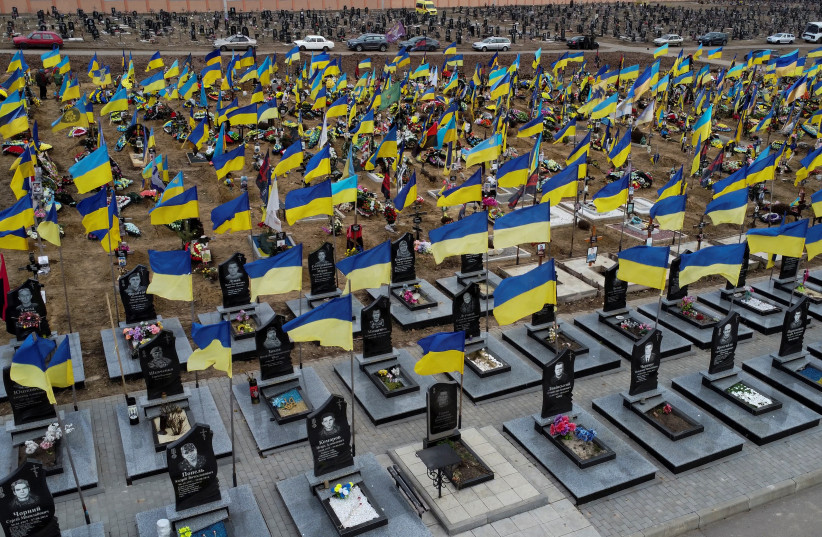WASHINGTON – Friday marks a year since the Russian invasion of Ukraine began. Russia still holds nearly a fifth of Ukraine, despite losing territory in major setbacks after failing to capture Kyiv at the outset of its “special military operation.”
Tens of thousands of Ukrainian civilians and troops on both sides are believed to have been killed in the war. Russian forces have destroyed Ukrainian cities and forced millions to flee.
Ukrainian Jewry
Jewish Federations of North America’s refugee resettlement program in partnership with the Shapiro Foundation has supported the local resettlement efforts of 18 Jewish communities in the US and Canada, which have collectively helped thousands of Ukrainians of all faiths and backgrounds to rebuild their lives in safety on North American soil.
“It’s really hard to believe that it’s not only been a year, but that it shows no signs of ending,” says Eric Fingerhut, CEO of the Jewish Federations of North America. “This is just a massive, massive tragedy.” He said that North America’s 146 federations responded to the humanitarian crisis “in phases.”
“Obviously, there was the initial response to the flood of refugees. And in that early phase, it was our existing infrastructure of global Jewish humanitarian relief through our partners, JDC and the Jewish Agency, Chabad, IsraAID and others that enabled this quick response,” he said.

“As the war [continued] in the second half of the year, we realized that we were going to need to continue to support the refugees... who were still in the region for [the] long term, the resettlement needs of refugees who made aliyah and also those in the United States,” he continued. “Now, we are looking towards even longer term, but also keeping up the humanitarian relief to those in Ukraine in the war zones.”
Each federation ran emergency campaigns and raised collectively, he explained. Over the course of the war, some $85 million in additional emergency funds were collected.
These funds provided 500,000 people with humanitarian assistance and relief. Overall, 700,000 meals were distributed; 63,000 received support in aliyah to Israel and 130,000 received medical care.
“We have been partnering with a number of very generous philanthropists, have been working, mobilizing our network of Jewish Family Services and human services agencies and federations all around the country to resettle refugees from Ukraine in the US,” said Fingerhut. “Of course, this isn’t just Jewish refugees. These are all refugees from the war.
“We’re going to stay involved as long as we’re needed,” said Fingerhut. “Obviously, it becomes even more challenging the longer this goes on to continue to meet all the needs. But that’s why we have strong and committed Jewish federations in every community, because we know that not every problem is easily solved and is solved in a day or a week.”
Hanna Zholnerchyk, originally from Kyiv, is one of those who were resettled in Greenwich, Connecticut, by Jewish Family Services of Greenwich, with support from the local Jewish Federation UJA-JCC Greenwich.
“I came here right before the war,” she said. “US and British intelligence continuously warned Ukrainians that something bad would happen soon. We had three days. The last flight out was a Turkish Airlines flight on February 20. I arrived in the US on February 21,” she recalls.
“My husband is still in Ukraine. He cannot leave Ukraine. My dad is still in Ukraine also. I’m here with my daughter Marta. She is 16 years old. JFS found a very good private school for her. She is applying for college. Nobody knew how life can change. What’s most surprised me is people. The generosity. When you are living your own life you don’t think that you can be in such a situation that you will need to ask for help,” said Zholnerchyk.
Lala Addeo, resettlement program volunteer coordinator at Jewish Family Services of Greenwich, helped welcome Zholnerchyk to Connecticut.
“As a Russian-Jewish refugee who fled Baku, Azerbaijan, in 1989 looking for a life of freedom and justice in the US, I knew firsthand about religious persecution, wartime survival and a tumultuous immigration route that spanned a nine-month journey with lots of uncertainty, danger and survival tactics,” she said.
“I was 10 years old at the time when my family traveled from Baku through Ukraine, Austria and Italy and finally arrived in Greenwich, Connecticut, in January 1990 thanks to the help of JFS of Greenwich,” said Addeo.
“When I heard about the crisis in Ukraine and the uncertainty these families were facing during wartime, I decided to get involved and help a new family. Experiencing the sacrifices others have made on my behalf so that I could have a better life and future, motivated me to return this wonderful gesture. These Ukrainian refugees were facing the same hardship, anxiety, and heartbreak that my family experienced 33 years ago.”
Reuters contributed to this report.
